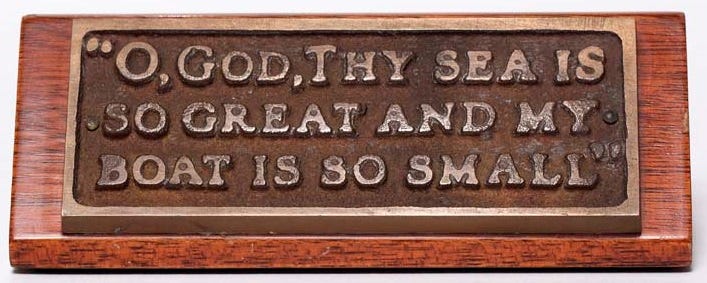“We’re facing dragons too. Fire-breathing griffins of the soul, whom we must outfight and outwit to reach the treasure of our self-potential and to release the maiden who is God’s plan and destiny for ourselves and the answer to why we were put on the planet.” Steven Pressfield, The War of Art
When I was working on the Paul Tudor Jones piece, a question kept popping into my head: why do I care? I’m not a macro trader. What can I learn from people who earn their living trading instruments I wouldn’t dare to touch? If speculation is just a social game of shuffling paper, is there anything to learn at all?
I know that my temperament is ill-suited to adopting the specific methods of a trader like Jones. That wasn’t always the case. Years ago, I caught the virus of making big calls on the market. I saw the signs of excess and believed I was smart enough to “call tops” and trade in and out of the most competitive stock market in the world. I never added up all the losses. It was too painful to look at. It probably cost me tens of thousands of dollars until I had enough scar tissue to accept that I wasn’t, in fact, smart enough to trade the market. In German that’s called Lehrgeld zahlen. I paid my dues.
Thankfully, I was able to let go. If I had any real inclination for gambling, maybe I would have spent many more years in that loop before flaming out. Mind you, I started my investing journey reading about deeply fundamental investors – Buffett, Lynch and the like. But the appeal of feeling smart, smarter than the herd, was too strong. It was foolish, but the urge was there and undeniable.
I also tend to take my interactions with the market personally. Whether it’s an error of commission (buy the stock and it promptly rolls over) or omission (a stock I knew would do well does indeed go parabolic, but without me). I would raise my fist towards the sky - this must be the market gods teaching me a lesson about suffering!
That’s obviously not a healthy attitude for a trader.
At least I learned something – if only about myself. My ego likes the idea of being the one to steer the ship back to Ithaca. A stoic with icy veins. But I am more aware of my limitations today. I learned that I am a mere mortal and need beeswax in my ears when the sirens sing.

Having learned that it’s not my destiny to commandeer a trading desk, why bother reading about one?
To me, the acts of investing and building companies are not so different from creating art, striving for innovation, and pursuing athletic achievements. The specifics are quite different. But the struggles are universally human and relatable. They are all stories of people looking for meaning in an unpredictable, complex, sometimes cruel world.
While there is the occasional practical insight, the primary lessons are internal. Not surprisingly, my takeaways from Jones’s story were about the inner game – dealing with ego, temptation, biases, and emotions. About the tension between ambition and humility, between conviction and open-mindedness, between seeing the big picture and pragmatism.
My favorite lens through which to view the stories of investors, entrepreneurs, innovators, traders, and dealmakers is the hero’s journey. I see them all as protagonists who leave the safety of their village, the known world, to embark on a journey. They face danger, navigate chaos, take risks. They find new friends and mentors on the way. Finally, they descend to the depths of the underworld. Their skills and their resolve are tested. To earn treasure, they must slay a dragon. They are on a quest for transformation, for learning, for growth.
Maybe you find that too dramatic of a metaphor. Think about it this way: our protagonist engages with the market. This could be a market for assets, like the stock market, or the marketplace for a product or service. It is a complex adaptive system. Impossible to predict and filled with other agents whose decisions are driven by rational analysis, biases, and outright fear and greed. In the long-term, this market may well be a weighing machine and the better mousetrap will succeed. But in the short-term, it can turn into a maelstrom of fundamentals, crowd psychology, liquidity, narrative, politics, luck. In the short-term, it can swallow the puny boat the hero calls their company. It is a maze with a minotaur lurking. A few wrong turns and you can end up dead.
Are you sure you want to enter, just to make a few measly bucks? Ah, but what if these depths held the key to gaining the admiration of your peers? What if you could finally be somebody?

As George Goodman wrote in the Money Game, money is simply a means for the players to keep score. While they do indulge in yachts, jets, and high-end condos, most of them would play for seashells if that was the way to keep score. Many can’t stop playing and refuse to retire. Their desire to play the game, to continue the journey, is innate. They have a drive to prove themselves and enter the dungeons again and again.
In their desire to keep wrestling with the cosmos I see an imprint of my own dreams. In their ambition I find inspiration. Their achievements humble me. Their belief in lucky sneakers cheers me up. In their mistakes I look for transformation. They are the main characters in a world driven by economic impetus, hurtling rapidly into the unknown.
As Alec Baldwin said, go and do likewise. Go look for treasure. Welcome the challenge. Enter the underworld. And face your dragon. Then return to your village and share the treasure with your tribe.





Good stuff
Second with the metaphor - ive felt that- art & finance at its intrisnic form is an abstraction - personally having started off as cinephile/critic and ventured into entrepreneurship - I've realized that entrepreneurs/ artist create an object that are made tangible out of such abstraction build objective realities - even if - the world outside cannot see the form ( initially) the entrepreneurs chases the same - because he/she feels its there ( ad infinitum)